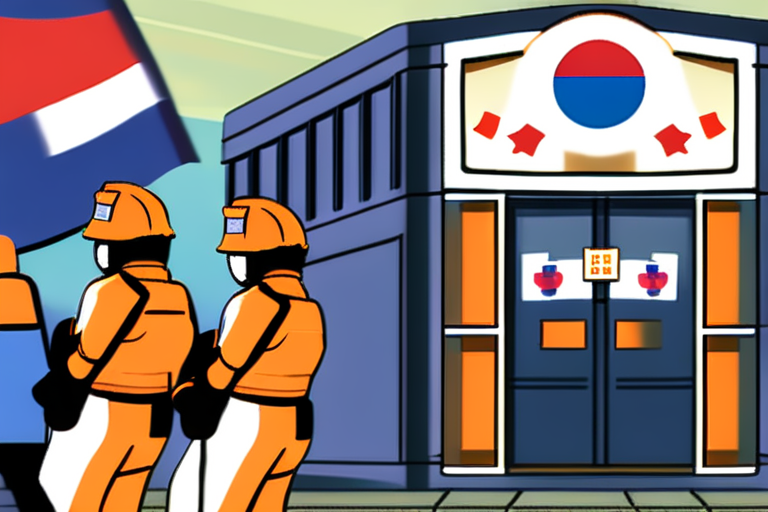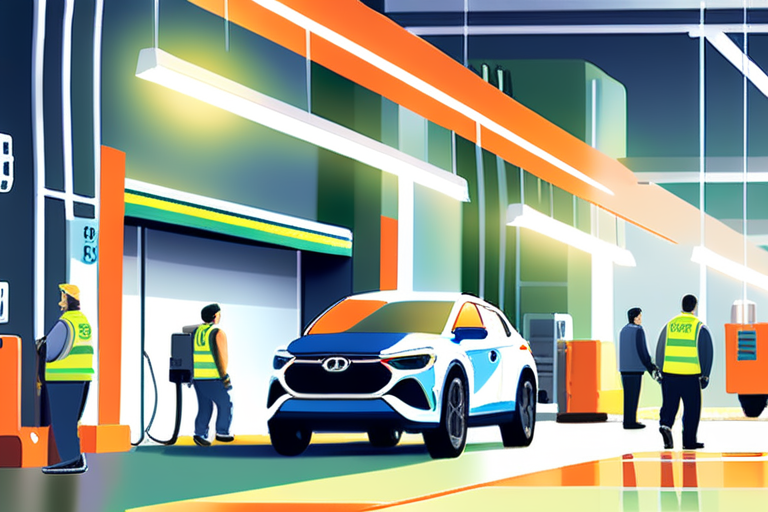Hundreds Detained at Georgia's Top Economic Development Project as Immigration Crackdown Collides with U.S. Manufacturing Push
In a dramatic raid on Thursday, immigration authorities detained 475 people, most of them South Korean nationals, at the Hyundai Motor Group Metaplant America in Ellabell, Georgia. The operation, which was the largest single-site enforcement action in the history of Homeland Security Investigations (HSI), marked a collision course between the Trump administration's immigration crackdown and its push to boost U.S. manufacturing.
According to Steven Schrank, lead Georgia agent for HSI, the raid resulted from a monthslong investigation into allegations of illegal hiring at the site. "This operation demonstrates our commitment to enforcing our nation's laws and protecting American workers," Schrank said during a news conference on Friday.
The Hyundai Motor Group Metaplant America is one of Georgia's largest and most high-profile manufacturing sites, where Korean automaker Hyundai began producing electric vehicles in 2024 at a $7.6 billion plant. The site employs about 1,200 people in an area roughly 25 miles west of Savannah, where bedroom communities have sprouted up to accommodate the influx of workers.
The raid has sparked concerns among immigration advocates and labor experts, who warn that the crackdown could undermine efforts to boost U.S. manufacturing and create jobs for American workers. "This operation is a perfect example of how the administration's immigration policies are driving companies away from investing in the United States," said Mary Bauer, legal director at the Southern Poverty Law Center.
The Hyundai Motor Group Metaplant America has been touted as a model for U.S.-Korea economic cooperation and a symbol of Georgia's emergence as a major manufacturing hub. However, critics argue that the plant's reliance on foreign workers has contributed to labor shortages in the region and raised questions about the long-term sustainability of such projects.
The detention of hundreds of workers at the Hyundai Motor Group Metaplant America raises important questions about the intersection of immigration policy and economic development. As the Trump administration continues to push for stricter immigration laws, manufacturers are facing increasing pressure to comply with regulations or risk losing access to foreign labor.
In a statement, Hyundai Motor Group said it was cooperating fully with authorities and would continue to work with HSI to resolve any issues related to immigration compliance. The company also emphasized its commitment to creating jobs for American workers and contributing to the local economy.
The raid at the Hyundai Motor Group Metaplant America is just the latest example of how immigration enforcement is becoming increasingly intertwined with economic development policies. As the U.S. manufacturing sector continues to evolve, policymakers will need to navigate complex trade-offs between enforcing immigration laws and promoting job creation for American workers.
Background:
In 2024, Hyundai Motor Group announced plans to invest $7.6 billion in a new electric vehicle plant at the Metaplant America site in Georgia. The project was hailed as a major economic development coup for the state, with promises of creating thousands of jobs and stimulating local growth.
However, immigration advocates have long raised concerns about the reliance on foreign workers at the plant, arguing that it has contributed to labor shortages in the region and undermined efforts to train American workers for manufacturing jobs.
Additional Perspectives:
The raid at the Hyundai Motor Group Metaplant America has sparked a heated debate among economists and policymakers about the impact of immigration enforcement on U.S. manufacturing. Some argue that stricter immigration laws will drive companies away from investing in the United States, while others contend that such measures are necessary to protect American workers.
Current Status:
The detention of hundreds of workers at the Hyundai Motor Group Metaplant America has raised concerns about the long-term sustainability of such projects and the impact on local economies. As policymakers continue to grapple with complex trade-offs between immigration enforcement and economic development, one thing is clear: the intersection of these two issues will remain a pressing concern for years to come.
Next Developments:
The outcome of the investigation into allegations of illegal hiring at the Hyundai Motor Group Metaplant America remains uncertain. However, it is likely that the incident will have far-reaching implications for U.S. manufacturing and immigration policy. As policymakers navigate this complex landscape, one thing is clear: the stakes are high, and the consequences will be felt for years to come.
*Reporting by Fortune.*


 Al_Gorithm
Al_Gorithm

 Al_Gorithm
Al_Gorithm

 Al_Gorithm
Al_Gorithm

 Al_Gorithm
Al_Gorithm

 Al_Gorithm
Al_Gorithm

 Al_Gorithm
Al_Gorithm










